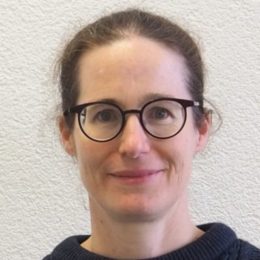About Sophie Martin
The Martin lab aims to understand how cells are spatially organized. Their efforts concentrate on probing the mechanisms by which cells pattern their cortex to achieve local function. Their work touches on the organization of the cytoskeleton and the plasma membrane, on the spatial organization of signaling pathways and on principles of cell polarization.
For their work, the lab mainly uses a simple eukaryotic model organism, the fission yeast Schizosaccharomyces pombe. This organism only encodes 5000 genes but 70% are conserved in humans. It offers a large palette of tools and displays a rich physiology, which allow to assign function and dissect molecular mechanisms of action.
The Martin lab has several ongoing projects spanning from (1) studying the composition and mechanisms of the core polarization machinery, (2) probing the mechanisms of gradient sensing and cell pairing in yeast cells, or (3) understanding how fungal cells locally digest their cell wall and merge their plasma membranes, to finally (4) investigate the flow of sterols through the cell and the role of the actin cytoskeleton in this flow. Earlier work focused on investigating the coordination of cell growth with division.
Sophie Martin earned her Diploma in 1998 from the University of Lausanne for her study of chromatin organization in the laboratory of Dr Susan Gasser at the Swiss Institute for Experimental Cancer Research (ISREC). She then joined the group of Dr Daniel St Johnston at the Wellcome/CR UK Gurdon Institute to study the molecular mechanisms of cell polarization and mRNA localization using Drosophila as model system and received her PhD in 2003 from the University of Cambridge. She obtained postdoctoral training in the laboratory of Dr Fred Chang at Columbia University in New York, studying cell polarization and the cytoskeleton in the fission yeast. In 2007, she joined the Center for Integrative Genomics at the University of Lausanne as a Swiss National Science Foundation Professor. She was appointed Associate Professor in 2010 and Full Professor in 2018 at the Department of Fundamental Microbiology (DMF), of which she was the director between 2020 and 2022. In 2023, she joined the Department of Molecular and Cellular Biology (MOCEL) at the University of Geneva as Full Professor.
She was selected as an EMBO Young Investigator in 2009, received the WICB Junior Award from the American Society for Cell Biology in 2012, and the Friedrich Miescher award and the EMBO Gold medal in 2014. She was elected EMBO member in 2020. She received three consecutive ERC grants, at starting, consolidator and advanced levels.
Contact
- Martin lab’s website
- Martin’s lab twitter account
- E-mail: Sophie.Martin@unige.ch

